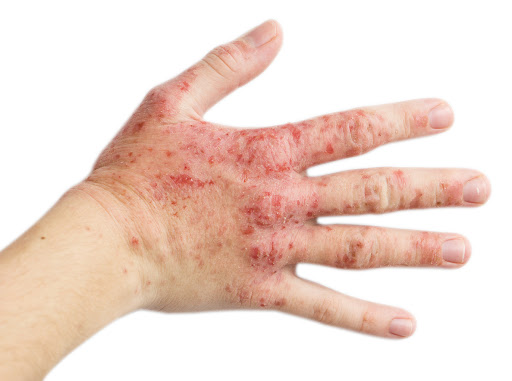
Credit: iStock.com/Injenerker
The unsightly painful red patches on the skin surface of your wrists, elbows, arms, ankles, and back of the knees may be alleviated with the use of essential oils for eczema. Whether the chronic skin condition causes dry, scaly skin or fluid-filled blisters, the natural healing properties of certain essential oils may help. If left untreated, bacterial infections may develop, but essential oils can be used in such cases as well.
For best results and to prevent any negative effects from the potency of essential oils, it is recommended to dilute these oils with carrier oils. These can include natural jojoba, coconut, and olive oils.
The exact cause of eczema has yet to be determined, but it is attributed to the irregular response of the immune system to both external and internal triggers. These may be related to a severely cold or hot core temperature, irritants, extreme stress, or a bacterial strain known as Staphylococcus aureus.
If you suffer from eczema, then you should try the effective essential oil recipes mentioned in this article. But first, you need to know what the best essential oils for eczema are.
In this article:
Best Essential Oils for Eczema
Using essential oils as natural home remedies for eczema may help reduce the inflammation of red and itchy skin patches without overdrying. So, what essential oils are good for eczema?
We have compiled a list of the best essential oils for eczema. Each essential oil has its own healing properties to target the effects of this chronic skin condition. But as mentioned, their potency should be balanced with the use of a carrier oil.
1. Tea Tree Oil for Eczema
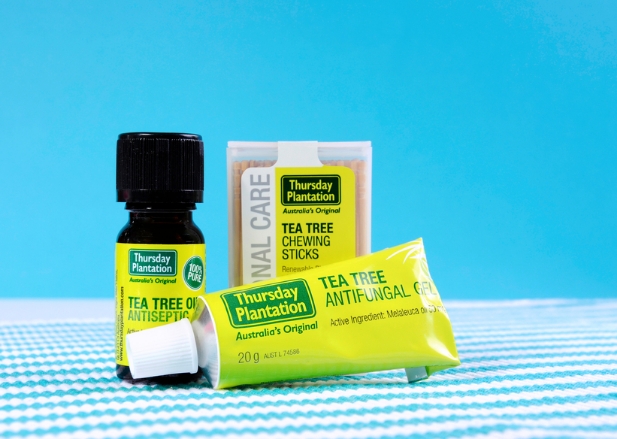
As one of the best essential oils for eczema, tea tree oil has anti-inflammatory and antibacterial components to target free radicals.
According to a study published in Herbal Treatments for Dermatologic Disorders, the oil works against Staphylococcus aureus and other bacterial strains.
The British Journal of Dermatology published a study where a group was tested with the use of tea tree oil to treat inflamed skin caused by histamine (a natural element produced by the body with any allergic reaction). The study found the use of tea tree oil alleviated the inflamed, red, and swollen skin of eczema.
2. Lavender Oil for Eczema
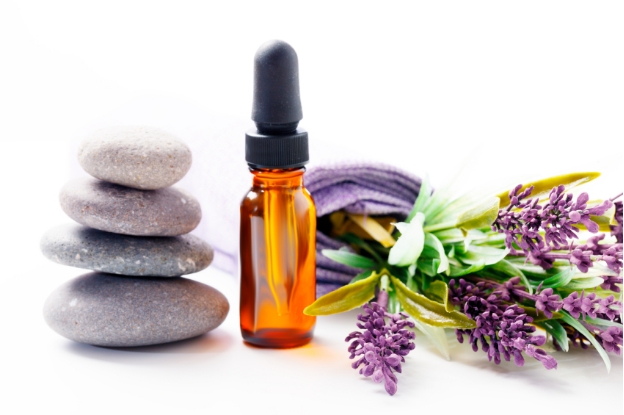
Lavender essential oil for eczema may treat the physical effects of eczema while it targets stress, which is considered to be an emotional trigger of the condition. Lavender has a natural component to reduce stress and offers antimicrobial, anti-inflammatory, antifungal, and antibacterial properties to treat the swelling, infection, and any pain accompanying the red rash.
The Journal of Ethnopharmacology published a study that found lavender essential oil to have these positive effects on eczema. It also recommends further studies to discover active components that heal the dry, swollen patches of skin.
3. Chamomile Oil for Eczema
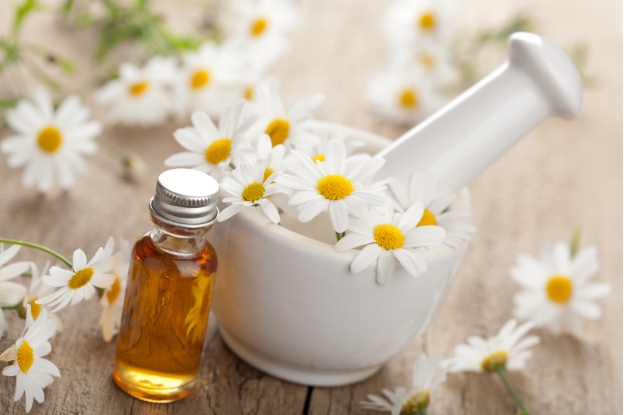
For years, German chamomile essential oil has been used to treat dermatitis conditions such as eczema. The anti-inflammatory, antimicrobial, and antispasmodic properties reduce swelling, pain, inflammation, and itchiness of the condition.
A study published in the second edition of the book, Herbal Medicine: Biomolecular and Clinical Aspects, suggests that the components in sesquiterpene alcohol, a-bisabolol, chamazulene, and flavonoids work as a natural hydrocortisone cream to reduce effects of eczema.
4. Thyme Oil for Eczema
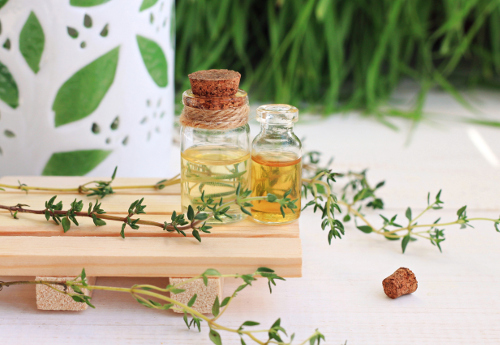
Thyme essential oil contains antimicrobial and anti-inflammatory properties to help treat inflamed skin. It may also prevent any secondary infections from developing.
The Journal of Lipid Research published a study showing that thyme oil may be powerful enough to destroy cyclooxygenase-2. Also known as COX-2, this enzyme triggers pain and inflammation of the skin.
5. Rose Geranium Oil for Eczema
The anti-inflammatory components of rose geranium essential oil may treat not only the red, inflamed skin patches of eczema but may also alleviate any itchiness felt.
This oil may also help prevent infection resulting from the open sores of eczema.
6. Basil Oil for Eczema
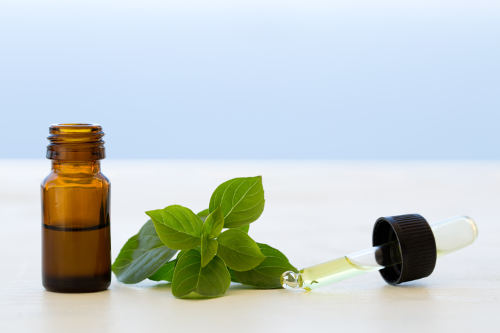
Basil essential oil, also referred to as holy basil or Ocimum sanctum, reduces inflammation with its anti-inflammatory properties while soothing any irritation. This essential oil relieves pain and itchiness.
7. Frankincense Oil for Eczema
Frankincense essential oil is one of the better essential oils for severe eczema, according to a study published in the Journal of Traditional and Complementary Medicine. The study concentrated on reducing the redness and inflammation effects of eczema.
It was also discovered that frankincense oil restores skin to its pre-damaged condition. It evens out lost skin tone due to the scaly patches of eczema.
8. Helichrysum Oil for Eczema
Eczema may cause the development of fluid-filled blisters. These can be treated with the anti-inflammatory and anti-allergic properties of helichrysum essential oil. These components may also help with the pain and discomfort of eczema patches.
The methicillin-resistant Staphylococcus aureus strain may also be destroyed with the use of this oil, according to a study published in the International Journal of Antimicrobial Agents.
9. Eucalyptus Oil for Eczema
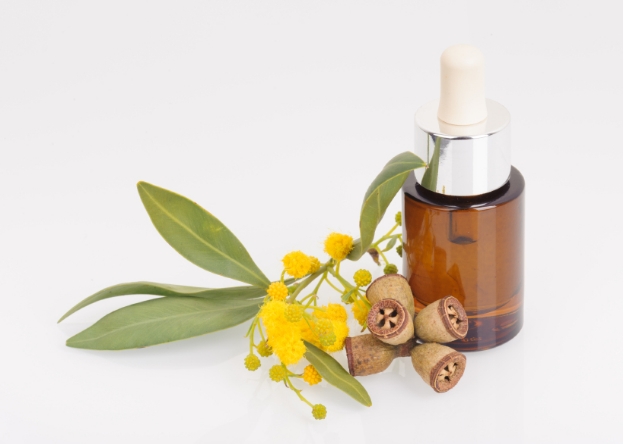
Eczema may present dry, red skin patches that can cause itchiness, inflammation, and possible pain. Eucalyptus essential oil may help to restore moisture to treat the rough, scaly areas.
The properties of eucalyptus oil include antimicrobial and antiseptic compounds. It also has anti-inflammatory power from 1,8 cineole, a natural chemical component.
10. Bergamot Oil for Eczema
Bergamot essential oil has anti-inflammatory properties to combat the swollen, red patches of skin that can develop with eczema conditions. This oil may also quickly destroy the pathogens causing the infection.
A study published in the European Journal of General Medicine shows the positive anti-inflammatory effects of bergamot oil on skin conditions.
11. Turmeric Oil for Eczema
The antioxidant, anti-inflammatory, and antibacterial properties of turmeric essential oil may quickly treat the swelling, itchiness, and redness associated with the scaly patches of eczema. The curcumin compound of turmeric suppresses inflamed skin cells.
Any formation of blisters, whether they are weeping or crusty, may also be healed with the use of the oil.
12. Evening Primrose Oil for Eczema
For years, it was reported that evening primrose essential oil worked to alleviate the itchiness, dryness, and inflammation of skin disorders such as eczema.
Today, several websites, including the National Institutes of Health, refute the recommendation of using evening primrose oil for eczema. It has been suggested that more studies are required to verify positive outcomes.
13. Borage Oil for Eczema
Borage essential oil has been used in the past to treat eczema symptoms. It has been suggested that an essential fatty acid called gamma-linolenic acid in borage oil may reduce the inflammation.
Borage oil is like evening primrose oil in that some studies have found no impact or positive change in eczema conditions with its use.
According to a study published on the Berkeley Wellness website, these conflicting studies caused doctors in the United Kingdom to stop prescribing borage oil.
Related Article: The Best Essential Oils for Pain Relief and Inflammation
How Essential Oil Works for Eczema
Essential oils have their own individual healing components for symptoms of eczema. Their antifungal, disinfecting, and antimicrobial properties target the pathogens that invade the skin. Additional properties can include moisturizing and soothing effects on eczema flare-ups.
An eczema condition is as unique as the person who is suffering from it. Various treatments and home remedies may not offer the same benefits to everyone. For the most beneficial treatment, use what works for your particular case on a regular basis.
Using a treatment as needed during flare-ups may help to alleviate the itchiness, discomfort, and pain that may accompany the unsightly red rash. Continue to use the treatment on a regular basis in between the flare-ups to prevent recurrence, or at least lessen the severity.
Using Essential Oils for Eczema
The itchiness and redness, as well as pain that may accompany the rash of eczema, can lead some patients to try various treatments. Some essential oils leave a greasy feel and look to the affected areas, which can be a negative setback to some patients.
A more appealing appearance may be achieved by using a non-oily base to dilute the essential oils in creams, salves, and lotions. This can include a water-based acrylic gel if the natural carrier oils are too greasy.
Aloe vera gel may be a good carrier to mix with essential oils to maximize the beneficial effects of essential oils.
Other Carrier Oils to Use for Eczema
Before you choose a specific natural carrier oil to use with essential oils for eczema treatment, it is important to know how these carrier oils work.
Virgin Coconut Oil
Coconut oil is often used as an essential oil blend for eczema, as it restores moisture to dry skin areas. This is a natural balm that soothes dry, rough skin by adding moisture during the healing process.
Shea Butter
The softening and moisturizing effects of shea butter also offer anti-inflammatory properties to treat the swelling and redness of inflamed skin patches. The fatty acids also work as antioxidants to treat conditions such as eczema.
Avocado Oil
Eczema may present red, raw patches of irritated and inflamed skin that may be alleviated with the use of avocado oil. It is rich in minerals and vitamins to heal these patches, according to the Journal of Wound Care.
Virgin Olive Oil
Published studies in Dermatitis have shown the powerful antibacterial effects of virgin olive oil. It helps to alleviate and possibly prevent the Staphylococcus aureus infection.
Vitamin E Oil
Using vitamin E oil as a lone carrier, as opposed to as a component of another oil, may help to speed up the healing of eczema.
According to the Journal of Molecular Medicine, vitamin E oil stops the thickening of the skin and acts as an anti-inflammatory agent by targeting free radicals.
Sweet Almond Oil
Eczema and other skin conditions have been treated for years with the natural emollient properties of sweet almond oil. In addition to softening the skin cells, the oil may also prevent scarring.
Jojoba Oil
With its anti-inflammatory and antiseptic components, jojoba oil may help with the chronic itchiness of eczema.
Studies published in Pharmacological Research confirm the possible treatment effects of jojoba oil.
Rosehip Oil
Adding the anti-inflammatory, antioxidant properties found in rosehip oil with the components of an essential oil may help speed up the healing process of eczema. This oil may target cracked skin, as well as redness and itchiness.
Quick Homemade Recipe to Use for Eczema
Any basic essential oil recipe for eczema will require the use of an essential oil combined with the healing components of a carrier oil.
Simply combine one tablespoon of a carrier oil your choice with two or three drops of an essential oil that helps to treat eczema. Then use a cotton swab or your fingertips to lightly apply the mixture to the affected areas on the body. Reapply two or three times daily until the patches of skin are healed.
These oils may reduce the inflammation, itchiness, redness, and chronic dryness caused by the eczema condition.
Ways to Use Essential Oils for Eczema with Recipes
1. Take a Bath
Calming Bath with Essential Oils Recipe
Ingredients:
- 2 drops of chamomile essential oil
- 2 drops of lavender essential oil
- 2 drops of geranium essential oil
- A carrier oil, such as jojoba or coconut oil
- Tub full of warm water
Directions
Dilute the essential oils with your favorite carrier oil. Add mixture to a tub of warm water and agitate with your hand.
Soak in the tub for 20 to 30 minutes or until the water cools.
2. Topical Application Using Compresses
Skin Compress Recipe
Ingredients:
- 1 quart of cool water
- 2 drops of chamomile essential oil
- 1 drop of lavender essential oil
- 1 drop of helichrysum essential oil
Directions
Mix the water and essential oils in a bowl. Soak a cloth in the mixture and apply directly on the affected area for five to 10 minutes. Repeat two to three times daily.
DIY Essential Oil Compress Blend Recipe
Ingredients:
- 2 cups of cold water
- 2 drops of geranium or lavender essential oil
- 2 drops of lemon or myrrh essential oil
- 1 drop of chamomile or cypress essential oil
Directions
Combine all the essential oils in a medium nonreactive bowl. Then add the water and stir well.
Soak a cloth in the mixture and place on affected area two times each day.
3. Topical Application Using Eczema Soothing Sprays
Essential Oil Spray Recipe
Ingredients:
- 1 cup of distilled water
- 10 to 15 drops of lavender essential oil
- Spray bottle
Directions
Combine the distilled water and the essential oil in the spray bottle. Spray the mixture on affected areas when needed.
Be sure to shake well with each application.
Anti-Itch Spray Recipe
Ingredients:
- 12 drops of lavender essential oil
- 12 drops of tea tree essential oil
- 12 drops of clove essential oil
- 12 drops of rosemary essential oil
- 4 ounces of jojoba oil
- Spray bottle
Directions
Mix all the essential oils with the jojoba carrier oil. Pour the mixture into the spray bottle and use it on the affected areas as needed.
4. Topical Application Using Eczema Shea Butter Creams
Shea Butter Cream Recipe
Ingredients:
- ½ cup of raw shea butter
- ½ cup of coconut oil, or ¼ cup of olive or almond oil
- 1 tablespoon of natural honey
- 30 drops of lavender essential oil
- 8 drops of tea tree essential oil
- 5 drops of geranium or myrrh essential oil (optional)
Directions
Use a double boiler to melt the shea butter and coconut oil. Once they are blended well, add the honey and stir. Then add the lavender and tea tree essential oils and continue to blend.
Let the mixture cool until it begins to thicken. Then use a mixer to blend for several minutes until it froths. Continue blending every 10 minutes until the mixture has the appearance of a lotion.
Pour the mixture into a container and store at room temperature.
Apply to the affected areas as needed.
Essential Oil and Shea Cream Recipe
Ingredients:
- ½ cup of shea butter
- 10 drops of geranium essential oil
- 10 drops of lavender essential oil
- Small jar
Directions
Combine the essential oils with the shea butter and place the mixture in a jar.
Apply one or two times each day to affected areas as needed.
Weeping Eczema Cream Blend Recipe
Ingredients:
- ¼ cup of shea butter
- 15 drops of lavender essential oil
- 15 drops of frankincense essential oil
- 15 drops of myrrh essential oil
- 10 drops of chamomile essential oil
- 1 teaspoon of vitamin E cream
- 2-ounce double-walled jar
Directions
In a small nonreactive bowl, melt the shea butter over a pot of simmering water. Add the essential oils and vitamin E cream to the liquified shea butter and mix well.
Once cooled, pour the mixture into the jar. Seal the jar once the mixture is cold enough. Apply to affected areas as needed.
5. Topical Application Using Eczema Skin Salves
Soothing Eczema Salve Recipe
Ingredients:
- ½ cup of virgin coconut oil
- ¼ cup of avocado oil
- ¼ cup of olive oil
- 3 teaspoons of beeswax pastilles
- ¾ teaspoon of vitamin E oil
- ½ teaspoon of arrowroot
- 40 drops of an essential oil of your choice (or a combination)
Directions
Use a double boiler to melt the coconut oil, avocado oil, olive oil, and beeswax. Stir constantly. Remove from heat and add arrowroot while stirring.
Allow the mixture to cool and add the essential oil(s) and vitamin E. Be sure to mix the ingredients well.
Pour the mixture into a glass jar and allow it to cool completely before sealing.
Apply the salve as needed, at least twice each day.
Dry Eczema DIY Oil Blend Recipe
Ingredients:
- 8 teaspoons of hemp seed, grapeseed, or sweet almond oil
- 10 drops of evening primrose oil
- 10 drops of chamomile essential oil
- 5 drops of myrrh essential oil
- 5 drops of lavender essential oil
- 2-ounce glass dropper jar
Directions
Combine all the oils in the glass jar and shake well.
Apply to affected areas as needed.
Massage Oil Recipe
Ingredients:
- 4 drops of eucalyptus essential oil
- 4 drops of thyme essential oil
- 1 tablespoon of rosehip seed oil
Directions
Dilute the eucalyptus and thyme essential oils with the rosehips seed oil. Mix well and apply the mixture to the affected areas.
6. Topical Application Using Essential Oil Lotions
DIY Essential Oil Symptomatic Relief Lotion Recipe
Ingredients:
- 5 drops of carrot seed essential oil
- 20 drops of lavender essential oil
- 5 drops of geranium essential oil
- 4 drops of bay leaf essential oil
- 4 ounces of vitamin E cream
Directions
Combine the vitamin E cream with all of the essential oils. Mix well and apply to the affected areas.
Hydrating Lotion Recipe
Ingredients:
- 20 drops of essential oil
- 8 ounces shea butter
Directions
Mix the essential oil and shea butter to form a lotion to apply to the affected areas.
Eczema Lotion Recipe
Ingredients:
- 2 tablespoons of shea butter
- 2 tablespoons of coconut oil
- 2 drops of geranium oil
- 5 drops of lavender oil
- 2 drops of tea tree oil
Directions
Fill a saucepan half way with water and place it on medium heat. Combine shea butter and coconut oil in a glass jar to be placed over the saucepan until oil melts.
Once cooled, add the essential oils and store in a cool, dry place. Apply to eczema two times each day.
Best Possible Relief Tips for Eczema
1. Don’t Use Dairy or Wheat-Based Products
Prevent eczema breakouts by consuming lactose-free milk while avoiding nuts, wheat, strawberries, eggs, pork, shellfish, processed meats, and carbonated drinks.
2. Take a Bath or Shower Frequently
Regular showers and baths will help prevent an eczema outbreak from getting infected. Clean the affected areas with mild soaps and avoid harsh chemicals found in many bath foams and soap.
3. Keep Your Skin Hydrated
Use hypoallergic and natural product-based lotions and creams to keep skin moisturized and hydrated. Dry skin promotes skin infections and wounds.
4. Apply Treatment Oils and Creams Regularly
Regularly apply treatment oils or creams to the affected areas and with eczema flare-ups. Once it is clear, continue to use treatment daily to prevent recurrence.
5. Use Oils Sparingly
The potent components of most essential oils may irritate the skin as opposed to healing it. So, use only two or three drops of essential oil to one tablespoon of any carrier oil when mixing.
Using essential oils for eczema treatment may offer relief from the itchy red patches that develop on various parts of the body. An internal or external irritant may cause the affected skin surface to worsen with the formation of fluid-filled blisters that can ooze and crust over. This may be an invitation for a bacterial infection.
The anti-inflammatory, antibacterial, antimicrobial, and antiseptic properties of some essential oils may destroy invading pathogens and speed up the healing process. Keeping the skin clean and free from irritants as well as regular use of essential oils in daily skin care may help to prevent recurrence of severe cases of eczema.
Related Articles:
20 Best Essential Oils: Health Benefits and Usage Guide
Essential Oils for Sunburn: Usage Tips and Recipes
Essential Oils for Cough, Cold and Congestion
Sources:
Koh, K.J., et al., “Tree rea oil reduces histamine-induced skin inflammation,” The British Journal of Dermatology, December 2002; 147(6): 1212-1217; https://www.ncbi.nlm.nih.gov/pubmed/12452873, last accessed August 30, 2017.
Hajhashemi, V., et al., “Anti-inflammatory and analgesic properties of the leaf extracts and essential oil of Lavandula angustifolia Mill,” Journal of Ethnopharmacology, November 2003; 89(1): 67-71; https://doi.org/10.1016/S0378-8741(03)00234-4, last accessed August 30, 2017.
Hamidpour, R., et al., “Frankincense (乳香 Rû Xiāng; Boswellia Species): From the Selection of Traditional Applications to the Novel Phytotherapy for the Prevention and Treatment of Serious Diseases,” Journal of Traditional and Complementary Medicine, October to December 2013; 3(4): 221-226. DOI: 10.4103/2225-4110.119723, last accessed August 30, 2017.
Boukhatem, M.N., et al., “Rose geranium essential oil as a source of new and safe anti-inflammatory drugs,” Libyan Journal of Medicine, October 7, 2013; 8(1). DOI: 10.3402/ljm.v8i0.22520, last accessed August 30, 2017.
Ishikawa, J., et al., “Dry skin in the winter is related to the ceramide profile in the stratum corneum and can be improved by treatment with a Eucalyptus extract,” Journal of Cosmetic Dermatology, March 2013; 12(1): 3-11. DOI: 10.1111/jocd.12019, last accessed August 30, 2017.
Chainani-Wu, N., “Safety and anti-inflammatory activity of curcumin: a component of turmeric (Curcuma longa),” Journal of Alternative and Complementary Medicine, February 2003; 9(1): 161-168. DOI: 10.1089/107555303321223035, last accessed August 30, 2017.
Nostro, A., et al., “Effects of Helichrysum italicum extract on growth and enzymatic activity of Staphylococcus,” International Journal of Antimicrobial Agents, June 2001; 17(6): 517-520; https://www.ncbi.nlm.nih.gov/pubmed/11397624, last accessed August 31, 2017.
Karaca, M., et al., “Investigation of Anti-Inflammatory Activity of Bergamot Oil,” European Journal of General Medicine, January 2007; 4(4): 176-179; https://www.researchgate.net/publication/27794736_Investigation_Of_Anti-Inflammatory_Activity_Of_Bergamot_Oil, last accessed August 31, 2017.
“Evening Primrose & Borage Oils for Eczema?” Berkeley Wellness, March 6, 2014; http://www.berkeleywellness.com/supplements/herbal-supplements/article/evening-primrose-borage-oils-eczema, last accessed August 31, 2017.
“Evening Primrose Oil,” National Institutes of Health; https://nccih.nih.gov/health/eveningprimrose, last accessed August 31, 2017.
“Eczema,” University of Maryland Medical Center, September 29, 2015; http://www.nahfoundation.org/health/medical/altmed/condition/eczema, last accessed August 30, 2017.
Ostrovsky, O., and Ostrovsky, L., “Cure Eczema With These Essential Oils,” Be Well Buzz; http://www.bewellbuzz.com/body-buzz/cure-eczema-with-essential-oils/, last accessed August 30, 2017.
“How To Apply Essential Oils Topically,” Herbalgram; http://cms.herbalgram.org/heg/volume8/files/EssentialOilsChapterExcerpt.pdf, last accessed August 30, 2017.
“17 Essential Oils for Eczema (Plus Recipes & Application Tips),” Essential Oil Sanctuary, March 18, 2015; http://essentialoilsanctuary.com/18-essential-oils-for-eczema/, last accessed August 30, 2017.
“What Are The Best Essential Oils and Recipes for Quick Relief of Eczema,” Essential Oil Benefits, April 11, 2015; http://essentialoilbenefits.com/what-are-the-best-essential-oils-and-recipes-for-quick-relief-of-eczema/, last accessed August 30, 2017.
Shenefelt, P.D., “Herbal Treatment for Dermatologic Disorder,” Herbal Medicine Biomolecular and Clinical Aspects, (CRC Press/Taylor & Francis: Boca Raton, 2011).
“Make Your Own Eczema Cream,” Dr. Axe; https://draxe.com/eczema-cream/, last accessed August 30, 2017.
